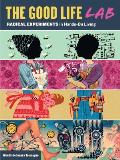
For seven years Mikey and I have been exploring a few pledges. We pledged to no longer make decisions based on money, to live from waste and from nature (both are free!), to make all our goods instead of buy them, and to share what we learn with others to keep knowledge free and open.
The pledges have led us to discover new ways to explore the world. We discovered an abundant life in which materials and knowledge come free of charge. June marks the start of a book tour. We're out promoting my new book, The Good Life Lab. The same pledges we made while living in New Mexico continue to guide us toward an abundant life even while on the road.
Our tour includes visiting bookstores, Maker Faires, hacker spaces, fab labs, and tech shops. At each stop we meet makers of all variety, people working with metal, wood, plants, glass, food, technology, and textiles. It is easy to notice that makers have a different view of the world than buyers of things. For one thing, makers know materials because they have to source them, so they know the origin of what they use, how materials are processed (or not), and what means of distribution delivered them. Makers are likely to know a material's viability and longevity, and the way it breaks down and returns to the earth. Consumers are not offered the same view. Consider the corporation that is mandated by law to make the most profitable decision in spite of the consequences to life (pollution, sweat labor, and the like). They choose materials differently. Makers, free of the mandate of profit, can make decisions that preserve life. If a maker makes something that becomes waste, they do so knowingly.
Makers know that they stand on the shoulders of others. Anyone who has ever made a thing knows that no idea is really their own. Ideas have histories; others have always contributed. That history and all the good ideas of others come free of charge to the maker. If you build the best new skateboard, a marvel of good design, you must admit that you did not invent rubber or ball bearings and you did not make the pavement the board rides on in order to function. While corporations operate for money alone and horde what they learn so they can turn it into profit, the connected view of the maker helps makers share and contribute to the commons, where good ideas can benefit us all.
I remember when I was deeply embedded in consumer culture, often after buying something, I learned that my goods were flimsy. They broke and I threw them away. I had no knowledge about where that waste went or what its cost was to the environment. The items I purchased did not come with care tags that revealed the real cost. As a maker I have a new choice.
Admittedly, while on tour I met makers who do not think deeply about the things they make — an opportunity missed. Even makers of things can make a world that does not support life. The maker culture has a chance to be a movement, but it won't be unless makers recognize the responsibility given to them. I believe that the maker movement sprung out of our disappointment with consumerism. Consumerism lacks meaning. It has no heart. Anything can be commodified and become a trend. Makers have answered an important question: Are we limited and mechanistic — consumers? Or are we unbounded and creative — creators? The maker movement says, Yes, we are creators. But another question immediately follows: What kind of world will we make?
Silk-screening at Maker Faire swap
Xeni and Mark check out a loom at the Maker Faire swap
Bay Area Maker Faire
Maker of Hand of Man: a hydraulic interactive hand
Goli and Wendy at the Vancouver Maker Faire
More from Wendy Jehanara Tremayne at PowellsBooks.Blog: